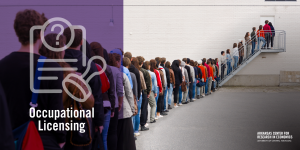By Caleb Taylor
Did a state’s occupational licensing requirements affect business creation during the Great Recession?
“U.S. State Occupational Licensing: Measuring its Impact on Business Establishments during the Great Recession” co-authored by ACRE Policy Analyst Alex Kanode, ACRE Scholar and UCA Associate Professor of Economics Dr. Thomas Snyder and ACRE Undergraduate Research Fellow Elsa Mattson (left), published in the International Journal of Business & Applied Sciences (Vol. 9 Issue 3, 2020), examines this question.
Mattson, Kanode and Snyder found that states and counties with higher licensing requirements had bigger losses in service business establishments during the Great Recession of 2007.
Mattson, Kanode and Snyder write:
Counties under severe licensing burdens have fewer service business establishments than counties under more lenient licensing rules. Severe licensing rules are associated with worse outcomes in a recession. A booming economy may cover up some of these burdens but they can manifest in a measurable way during recessionary times. The evidence from our study provides policymakers some guidance for licensing reform. During economic recessions, any restriction on labor can be more impactful than in a growing economy. Reducing licensing requirements can allow labor flexibility so society can be more adaptive during downturns in the economy.”
The paper was part of Mattson’s 2019–2020 ACRE Undergraduate Research Fellow project. ACRE fellows work under the mentorship of a UCA Professor and/or ACRE expert to produce and publish a research paper for an academic journal.
For more on this topic, check out our labor market regulation research page.
Kanode and Snyder discussed in “Show-Me the way” (published in the Arkansas Democrat-Gazette on October 22, 2020) a recent occupational licensing reform bill passed by the Missouri legislature, known as universal licensure recognition.
Arkansas’s occupational licensing burdens are measured in this research paper, entitled “The Effects of Arkansas Occupational Licensure Regulations,” by Snyder.
Snyder was a co-author of “The State of Occupational Licensing: Arkansas” with researchers from the Mercatus Center. This report gives an overview of occupational licensing in Arkansas and makes suggestions for reform.
Mattson’s research from the Fall, 2019 semester was featured in an op-ed published on Feb. 5 in the Morning Call entitled “Why Pennsylvania should help former inmates get job licenses,” about recent reforms in Pennsylvania that make it easier for former prisoners to obtain employment.

